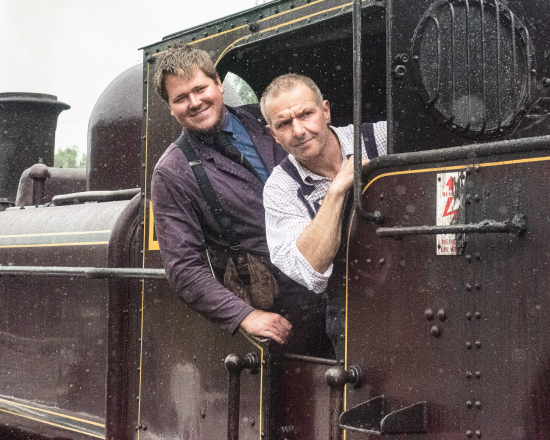Become A Volunteer
Our volunteers are what make the South Devon Railway; they are essential to the work that we do. They come from all walks of life and have a wide array of different skills that help us to keep the wheels turning. With hundreds of volunteers along our line, performing a huge variety of meaningful and enjoyable – sometimes challenging – roles, you’ll fit right in.

No previous experience of working or volunteering on a railway is required, and you certainly don’t need to be a railway enthusiast, just a friendly and cooperative attitude will unlock a rewarding volunteer role, for you, at the South Devon Railway.
Almost all of our train crews are volunteers; performing the roles of drivers, firemen, guards, travelling ticket inspectors and buffet attendants. As well as roles on our trains there are a whole host of other tasks off the trains, from booking and enquiries office clerks, to station staff and signalmen.
In addition to front line operational roles, there are plenty of other hands-on roles from engineering jobs in the workshop, to platelayers on the permanent way, restoration work in the Carriage & Wagon or station restoration departments, cleaners and shed hands in our locomotive running shed and a whole range of jobs in the Signal & Telegraph department.
For those who like to keep their hands a little cleaner or can not get down to the railway very often, we have plenty of admin based roles including jobs organising events with our special events team, roaming reporters for our social media and newsletters, assistants in our shop or cafe, plus a whole host of other administrative tasks.
You don’t need any special skills to be a volunteer with the South Devon Railway – but if you do, let us know as we can most probably put them to good use, whether they are railway skills, engineering, building, DIY, general management and administration or even gardening! Volunteers often have an interest in a specific area so we will give them any necessary training to enable them to help.
Induction Days
If all that sounds great to you, and you want to jump aboard, the first step is to attend an Induction Day at the railway.
Our induction days introduce you to the railway providing you with information on who we are and what makes us tick. You’ll meet some of the people and see some of the places that will become part of your journey with us.
You’ll have a chance to find out about the wide variety of roles and tasks that we undertake, and to have a chat with our existing volunteers to help you decide what role/s will suit you. Some people join us with a very clear idea of what roles they want to do, and some have no idea at all – whichever you are, you are most welcome – and you can always change your mind later!
If you would like to join us for an induction day please fill in, and submit, the form below. Once received one of our volunteer liaison team will contact you as soon as they can.
Are you a Carer or Enabler Representing a Client?
If you are representing someone with additional needs who is interested in volunteering with us, we want to ensure we provide the best support possible. Rather than filling out the standard form right away, we encourage you to initiate contact with us.
By reaching out to us first, we can have an informal discussion about potential volunteering opportunities tailored to their needs. This proactive step helps us better understand their preferences, ensuring a smooth and enjoyable volunteering experience. We truly value your input and are committed to accommodating diverse backgrounds and abilities.